Contract Attorney and Paralegal Hourly Rates
The definitive guide for law firms, legal departments, and legal professionals
Contract attorney hourly rates vary from $20/ hour for entry-level legal services to $200+/ hour for specialized, experienced attorneys. Pricing factors to consider when assessing an average hourly rate include practice area, experience, the volume and consistency of work, and whether payment is rendered to an independent contractor or W-2 employee.
We’ll walk you through how to price contract attorney and paralegal hourly rates, the overhead and compliance costs to consider, and how to maximize the return on investment (ROI) for your law firm, whether your fee structure is based on contingency fees, flat fees, or hourly billing.
Chapters
Everything to consider when calculating average hourly rates for contract attorneys and paralegals
First, let’s review the ethics rules…
The ABA Standing Committee on Ethics and Professional Responsibility and most jurisdictions allow firms to markup contract attorneys
- Most jurisdictions (with the exception of Texas and nuances to this rule in Florida) provide for the marking up contract attorneys so long as the firm works with them and bills them as they would other attorneys at their firm. There are nuances—such as requirements to disclose to the client—that vary by state, so always consult the rules in your state.
- The ABA Standing Committee on Ethics and Professional Responsibility in Formal Opinion 08-451 states that contract attorneys can be marked up if:
- The markup is reasonable.
- The attorney retaining the contract attorney and holding the client relationship remains ultimately responsible for the work product and ensuring other rules of professional conduct are followed.
- If the firm bills the client for the contract attorney as a legal fee, not as a disbursement.
If you are having your own doubts about marking up contract attorneys, check out our overhead costs and considerations chapter here to better understand why the ABA and other lawyers feel this is justified and why contract attorneys are not without their own overhead costs to your time and your practice.
Now let’s review how contract attorneys can help your firm thrive…
How can contract attorneys and paralegals increase growth, profitability, and employee and client satisfaction?
1. Lean Law Tool:
Lean focuses on the voice of the client and eliminating waste. Clients are happiest (and more likely to remain loyal) when they feel that they are paying fair and reasonable attorney fees and aren't being overbilled. In law, your product is your people, so not properly matching talent to the job at hand can be both wasteful and a suboptimal experience for your clients. If you are an experienced attorney who is a solo or a partner at a small law firm, your client doesn't want to pay a rate appropriate for your level of experience for legal work that could be done by a less-experienced or paraprofessional just because one isn't available. Billing the client at your hourly rate is a waste for the client, while billing yourself at the rate of a junior attorney is a waste for you.
65.90% of firms utilizing contract attorneys are finding increased profitability.
Likewise, low hourly fees are not always a bargain. When your clients have more niche or specialized issues and you direct an associate who is a generalist or specializes in a different area of law, the associate learns on the job and bills your clients for their education. For example, paying a highly-skilled specialist $200/hour who can complete the job in 3 hours will ultimately cost less than someone learning on the job at $100/hour who will take 10+ hours to potentially produce a less desirable result. Having a bench of contract attorneys can give you access to the type of lawyer that your clients need when they need them.
Contract attorneys can also allow you to keep your billable rates competitive and better implement alternative fee arrangements while maintaining or increasing profitability since you don’t have to shoulder the financial burden of full-time payroll for underutilized associates or paralegals.
All these reasons are why contract attorneys and paralegals have become the industry-favored "just in time" talent strategy that helps match the costs to business cycles and the right talent specializations to demand. If your law firm is not on an hourly billing model and you are working on flat or contingency fees, contract attorneys can help you reduce your own overhead to make these models sustainable and profitable.
Link Between Alternative Fee Arrangements & Alternative Staffing

Salaries as a % of All Law Firm Costs

2. Law Firm and In-House Growth Strategy:
Growth is a challenge and opportunity presented to firms ranging in size from solos to 100+ attorneys. As business picks up, particularly in uncertain times (hello, 2020s), you may have too much work for yourself and/or your current team. Still, this may not warrant another full-time employee and salary, and you may be concerned about economic downturns when inbound work and lawyer hourly rates soften. If you're a personal injury law firm or other firm that works on contingency fees, you may also be concerned about staffing up for a big case that could settle, resulting in less work and lower contingency fees.
In these situations, you’re likely hesitant to take on the risk and payroll burden of a new employee—and to hire someone away from another full-time job when you’re unsure that business and your firm’s finances can support an additional employee in the future. This is where contract attorneys and paralegals can shine, and likely why about one-fifth of legal payroll spend is now devoted to contingent talent; 77% of in-house legal departments with 50+ lawyers, 70% of law firms with 250+ lawyers, and 55% of all law firms utilize contract attorneys.
Contract Attorney Usage by Organization

A contract attorney or paralegal can allow you to meet your law firm or legal department’s growth where it is. You can expand the personnel hours that you pay for as your business grows to support them rather than investing in a full-time hire before you have the consistent business and revenue to support them and their paycheck.
Payroll Dollars in the Legal Industry

3. Avoiding the Costs of Burnout and Talent Turnover:
Has your business ever picked up before you were able to make another hire? Did you respond by making yourself and your other team members work increasingly long hours? Did you and/or other team members get burnt out to the point that you ultimately became less productive or perhaps you lost a trusted employee to another job as a result?
Overworking yourself, associates, and paralegals versus committing to another full-time hire can be a logical reaction and can seem like the only solution to feast and famine cycles. These cycles are particularly stressful all around for law firm owners. During feast cycles, you and your team are run into the ground, during famine cycles firm owners may be up at night worrying about whether they can support themselves, their employees, and generally keep the lights on. Every extra person on payroll during a famine cycle ups the stress levels.
One of the most overlooked cost-saving opportunities with contract attorneys is sparing you and your team from the emotional and financial fallout of feast and famine cycles. Creating a work culture that doesn’t work your team into the ground can give smaller firms with smaller budgets an edge that attracts and retains top talent and in turn, helps you to attract and retain more clients.
“Attorneys are now more willing to trade salaries for intangibles”
— Harvard Business Review
In addition to lost productivity, a culture of burnout puts you at a high risk of losing star employees. The cost here is not just the time it takes to replace your star associates—and the loss of their billable hours and yours as you replace them—but also the risk of having some of your clients follow them to their next firm. Further, the loss of a superstar can make daily work life at your firm more difficult for you and your team while you look for a replacement— and risk the loss of further crucial employees. And, a replacement that isn’t of the same caliber or worse can actively bring down morale.
The often unconsidered cost of a bad hire is staggering—which is a risk with any hire. According to The U.S. Department of Labor, the average cost of a bad hire is equal to 30% of their annual salary. Research in Organizational Behavior estimates the average time to replace a bad hire is 30 days and that bad hires result in an estimated 30-40% drop in team performance and morale. Further, high-performing employees are 54% more likely to leave when working with a toxic employee.
Unconsidered Costs of a Bad Hire

Avoiding the cost of a bad hire should be considered when using contract attorneys or paralegals for a temp to perm hiring strategy and determining the value of their hourly rate.
4. Hiring Strategy
Unconsidered Costs of a Bad Hire
Avoiding the cost of a bad hire should be considered when using contract attorneys or paralegals for a temp-to-perm hiring strategy and determining the value of their hourly rate.
Contract attorneys can also be part of a permanent hiring strategy to help you test out and make the best hire when you are ready for a full-time hire—and avoid the cost of a bad hire. You’ll avoid making a permanent hire that kills your firm culture. The ability to quickly and easily cut ties if a relationship isn’t working out without the risk, liability, obligation and cultural fallout of firing a permanent employee is one of the benefits of the “date before you marry” arrangement that contract attorney relationships accommodate.
With this strategy, you’ll have insight into the work product and the knowledge of whether an attorney or paralegal who begins working with you as a contractor is a good fit—an insight you don’t have when hiring an employee in the traditional manner. And, you’ll also reap a return on your investment in hiring and onboarding a contract attorney with whom you’ve established a good working relationship since you won’t have to invest the time and energy into hiring and onboarding again. All of these reasons are likely why about 1/5 of Hire an Esquire’s contract lawyers and paralegals end up being converted to full-time employees.
In summary, effectively utilizing contract attorneys and paralegals can be a way to scale your law firm or legal department without the risk and financial stress of a full-time employee on your payroll. Contract attorneys can also help you to improve your client experience and attract new clients through better cost structures and arrangements. Strategically working with contract attorneys and paralegals can also help you to build a strong work culture that supports the mental health of you and your team—and creates a place where everyone is excited to work.
1. Time and Money Invested in Sourcing & Vetting
Investing time in sourcing and vetting is crucial to ensuring you have the best talent. The fallout from making a bad hire (even on a contract basis) will cost you in both the time it takes to manage a suboptimal hire and/or redo their work product, in addition to any amounts you agree to pay the contractor to settle up the relationship. And, of course, the time you invest here should be averaged into the true cost of a contract attorney or paralegal’s hourly rate. When thinking about the cost in dollars of the time you spend to bring a contractor on board, you should think about what your time is worth based on your own billable rate. Since, on average, an attorney bills two-thirds of the hours they work, we suggest viewing the hours you spend on hiring at your billable rate.
Here are the average time and costs to consider when sourcing and vetting an attorney based on whether you choose a DIY, traditional agency, or Hire an Esquire approach to hiring contract attorneys or paralegals.
Average Hours to Hire Contract Attorneys and Paralegals
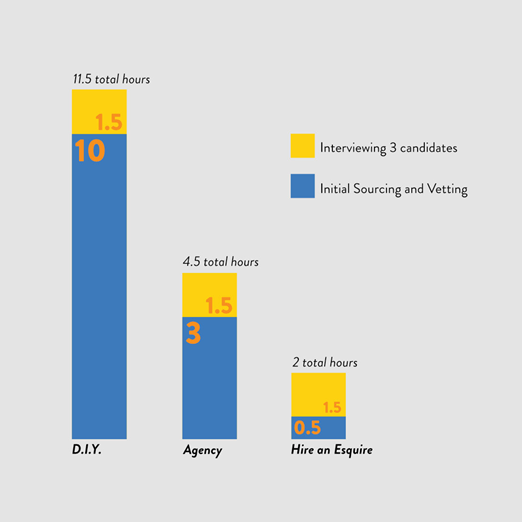
The time and cost of sourcing should be considered when determining how much a contract attorney or paralegal’s hourly rate actually costs.
THE DIY APPROACH
The DIY approach to hiring a contract attorney or paralegal takes an average of 11.5 hours with a large part of this sunk into initial sourcing and vetting. Other time commitments not included in this estimate are tax and employment compliance paperwork and verifications as well as researching and putting together a good set of interview questions to ensure you are getting the most predictive value out of the interview and uncovering a candidate’s maximum potential... or potential red flags.
On average, from surveying our own small law firm client and legal department clients, they spend ~11.5 hours and $125 on paid job boards per contract attorney or paralegal role when they run their own hiring process. Time spent hiring at large organizations varies widely and often takes longer due to how much process, bureaucracy, and people are involved in the process.
If you choose the typical DIY contract hiring process, you should expect to create a job description and to post it on a variety of paid job sites, and/or reach out to your own networks through LinkedIn, professional organization listservs, and/or emails. You should also expect to spend time sorting through and determining the legitimacy of applications, asking follow-up questions to applicants, and further researching their backgrounds online and their standing and disciplinary history with the state bar. Other tasks include responding to and scheduling interviews with potential applicants as well as people in your own network who reach out to you with leads (that are sometimes irrelevant but still can necessitate taking a call with a potential applicant as a courtesy). This part of the process takes an average of 10 hours. Then, the average client will interview three candidates per role and spend 30 minutes per interview.
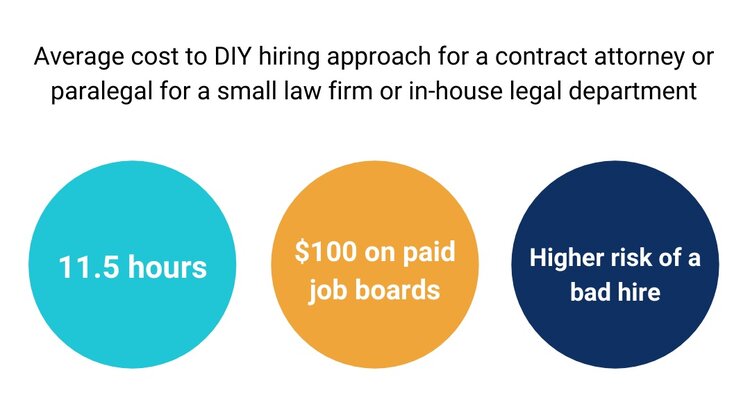
While your contract hiring process can and should be more lightweight than your permanent hiring process, if you don’t already have one, you’ll want to come up with a list of standardized questions to ask applicants to assess whether they have the right expertise and soft-skills for the role. There is research and science behind how to hire and best predict candidate performance. While no method can provide a 100% guarantee of the perfect hire, research on hiring practices provides insight into how to increase your chances of success and decrease the likelihood that you’ll have to shoulder the costs of a bad hire.
Asking all candidates the same questions will help you to best compare and assess their answers and fit for the role. You can check out our tips on how to assess a lawyer’s soft-skills to predict performance.
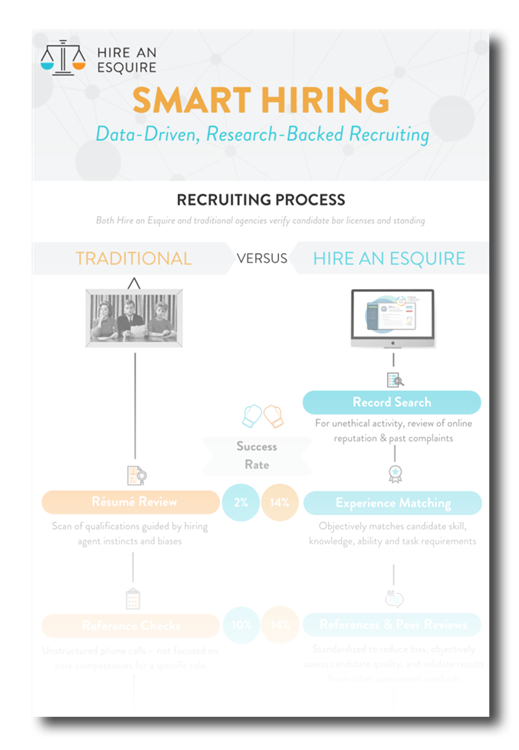
Using a structured, research-backed hiring process can increase your chances of a good hire and help you to get the maximum ROI on the hourly rate that you pay a contract attorney or paralegal.
The advantage of the DIY contract attorney hiring process is that you own the relationship and pay no markup on the hourly rate as you would through an agency or other service to find contract legal professionals. Note that you may be responsible for payroll taxes, insurances, and benefits, as discussed in the compliance section below, that will effectively create a markup on the hourly rate.
A major disadvantage is that your primary focus is running a law firm and you do pay for this method in your own time investment, context switching, and in a higher risk of a suboptimal hire. Bad hires, even for contract work, can be costly in additional time, money, disputes, frustration, and potentially client trust if you don’t have the time to or fail to catch and fix suboptimal work. All of these costs—in addition to the hourly rate that you pay the contractor—should be accounted for when you are considering the true hourly cost of a contract attorney or paralegal.
THE TRADITIONAL LEGAL STAFFING AGENCY APPROACH
Traditional legal staffing agencies can save time and frustration on initial sourcing and better ensure candidate quality. Agencies also generally offer some guarantees and contractor relationship management services that help to mitigate the financial costs and emotional labor of ending a relationship with a suboptimal contract attorney or paralegal. For traditional agencies, a short call or email exchange can return curated resumes within 48 hours for more generalized/available roles and within a week for specialized roles. Agencies generally work on a success basis, so if you don’t find a suitable candidate or you ultimately decide not to hire, you haven’t spent any upfront costs on job postings, and your initial time investment to understand the market of qualified candidates is minimal.
Providing feedback on resumes, requesting additional candidates, and playing a game of telephone or an exchange of multiple emails with the recruiter to tease out details takes an average of three hours when the bits of time, responses to emails, and interruptions are added up. This takes more time if it’s a new recruiter relationship and/or your recruiter is missing the mark and less time if it’s a recruiter who knows you and your firm well and regularly provides the right fit.
Interviews with candidates that you wish to interview typically take about 1.5 hours based on an average of three candidate interviews at 30 minutes each. The agency handles I-9s, 1099s, W-2s, and other employee and contractor forms, verifications, and compliance.
If you have a good recruiter your chances of success and a smooth working relationship are high. Much of your experience and success with an agency can depend on the individual recruiter who has been assigned to your firm or legal department since it is a very manual process and individual recruiters tend to work fairly autonomously.
The additional time, cost, and risk savings that come with using an agency are that they generally stand behind their work. Legal staffing agencies generally carry professional liability insurance policies on their legal professionals that offers another layer of liability protection to you and your firm in a worst-case scenario. In more typical scenarios, if there are issues with the work product of a contract attorney or paralegal, an agency will manage quickly finding a replacement and the emotional labor of firing a candidate. Agencies will typically comp you for all or some portion of the initial hours billed by the candidate with whom you are unhappy, whereas many attorneys engaging in DIY hiring will end up compensating a suboptimal hire for all or part of their work to dispose of the situation and reduce liability.
So, what is the cost for this service and guarantees? Agencies mark up contractors that they classify as their independent contractors an average of 30-50% on top of their hourly rate and those they classify as employees where the agency acts as the employer or record responsible for payroll taxes and benefits by 65%-100%. The lower end of these ranges tends to be for more basic roles where there is a strong supply of candidates, and the upper range of markups is what you will pay for more specialized, pedigreed, and hard-to-find candidates. Keep in mind that for employee relationships as opposed to independent contractors, the agency is paying the 15-20%+ you would typically be paying as an employer including payroll taxes, insurances, benefits, and paid leave requirements that now exist in many states and even cities (such as New York) and are increasingly being added to federal legislation such as the CARES Act.
THE HIRE AN ESQUIRE APPROACH
Hire an Esquire flexes to your needs. For a flat subscription, at Hire an Esquire, we provide many of the services of a legal staffing agency. For the full legal staffing agency experience, we offer payroll services. Our subscription service provides vetting and verification of credentials, whereas our payroll manages taxes, withholding, and other compliance-related matters. Additionally, at Hire an Esquire, we have married science and technology for a more efficient and precise staffing experience. This saves on 1) the time invested in contingent hiring, 2) the risk of a bad hire by providing better insight into how a candidate will perform, and 3) agency fees, thanks to the efficiencies of technology and our business processes.
Hire an Esquire cuts your time investment in contingent hiring by more than half from a typical agency. After answering a few questions in our job wizard you instantly receive recommendations for vetted, verified candidates. You can view additional recommendations and ask candidates of interest follow-up questions instantly and directly without going through a recruiter.
In addition to verifying identity, bar standing, and professional records like a typical agency, Hire an Esquire has a structured vetting process for candidates that collects data on both their hard and soft-skills so you’re consistently getting strong data-driven candidate recommendations. With a standardized vetting and matching process, your candidate recommendations won’t have the variability of an individual recruiter’s abilities and their prioritization of your project. Human recruiters are often juggling many clients, each of whom requires a high amount of service. They can be motivated to put your project and the candidates they send you in second place as they focus on and prioritize candidates for bigger and more profitable projects and client accounts. At Hire an Esquire, candidate recommendations are consistently objective regardless of the size of your project or your status.
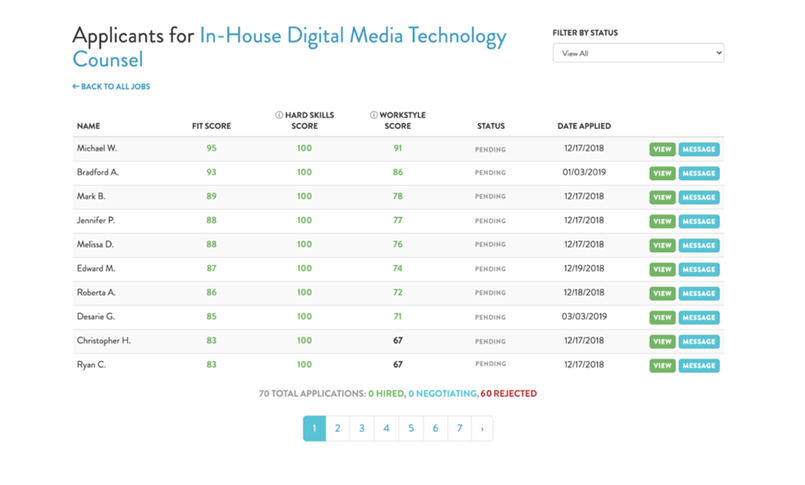
Our applicant view helps you to make data-driven hiring decisions and sort through potential candidates faster, decreasing the cost of your time and the effective hourly rate when hiring contract attorneys and paralegals.
The data and research behind our candidate recommendations and matches can also help you save on the cost of a bad hire. When you receive applicants on Hire an Esquire, you will see their experience with each qualification required for your role and the soft-skills as determined by years of legal industry and general industrial-organizational psychology research to be the most important to your job and work environment. In addition to having research-backed data to predict a candidate’s success, this can make the process of hiring simpler and faster by taking some of the guesswork out of whom to interview and whom to hire. You can read more about how lawyer soft skills predict performance here.
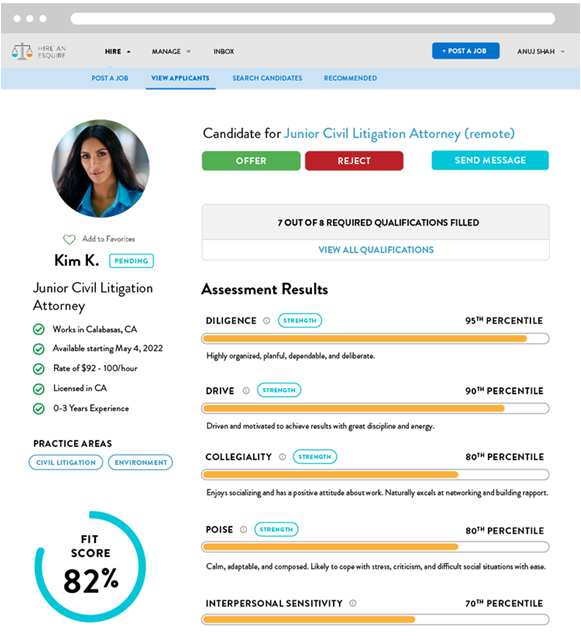
Further, you can reach out to candidates immediately with an invitation to apply to your job and/or questions about their experience, which cuts down on the time spent communicating with candidates through a recruiter. With this on-demand legal hiring experience, the initial sourcing and vetting commitment on Hire an Esquire is about 30 minutes.
Our Fit Scores and soft-skill analysis are provided as part of our hiring experience. Because of the efficiencies of technology, we can offer a more comprehensive sourcing and vetting service than the typical legal staffing agency as an economical subscription service instead of the indefinite markup and allow you to leverage payroll services if, and when, you need them.
Compliance and Payroll Costs and Considerations:
When carefully calculating a contract attorney or paralegal hourly rate, many small law firms forget to account for the tax and compliance costs and are unaware that contract attorneys and paralegals they assume are independent contractors may actually need to be classified as employees. Failure to properly classify contract workers can result in penalties and fines in addition to the back taxes owed. The fines and penalties for misclassification are in addition to (and often much heftier) than the employer taxes and fees that would have been paid originally with proper classification. The fines, penalties, and legal headaches of misclassification can quickly wipe away any gains from hiring contract attorneys or paralegals.
1. Employment Compliance Considerations
Most traditional agencies will assist in ensuring the proper employment compliance of your contract as will Hire an Esquire when you opt to use payroll services. Both will also manage and/or pay the related taxes, insurances, benefits, and relevant paperwork as part of the fee and service they provide.
If you choose the DIY hiring approach you are responsible for proper worker classification at the federal and state level. While there is no penalty for classifying an independent contractor as an employee, classifying a contract attorney or paralegal as an independent contractor when the IRS or a local state agency determines they should be classified as an employee can be a costly mistake.
For federal compliance, the IRS uses a multi-factor test—where no single factor is determinative—that examines factors including control, supervision, the cadence of work, and opportunity for profit and loss. You can find more about the information that the IRS considers when making a classification determination here.
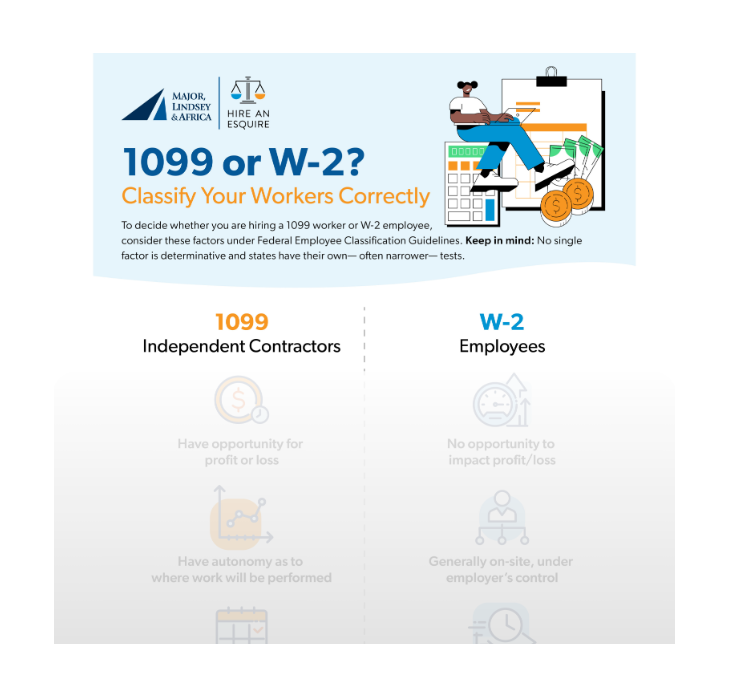
Whether the IRS will require that you classify your contract attorney or paralegal as an employee or independent contractor greatly impacts the cost and hourly rate.
States can have additional and more stringent requirements for worker classification. For example, some jurisdictions have adopted the ABC test which requires that workers performing outsourced work that is part of the organization's core business be classified as employees. Under this test, law firms would have to classify contract attorneys and paralegals as employees but in-house legal departments may not.
Some states, like California, have exempted attorneys and other professionals from the ABC test, but this does not mean that the federal and IRS requirements don’t apply. For instance, a document review attorney in California, in most cases, would need to be classified as an employee to comply with the IRS requirements, even though they may seem to be exempt under California law. You can read more about state and federal classification criteria here.
Failure to properly classify employees will result in having to pay the back taxes and costs you would have had to pay for an employee, plus fines and penalties that are in addition to and can be more than the original tax burden owed. This issue can be raised by a contractor who has not paid their taxes throughout the year and when faced with this burden asserts, they are an employee, or by the IRS and local tax agencies and unemployment funds. Proactively seeking out employee misclassification tends to be more common during recessions when state and federal unemployment funds dip. Keep in mind that if you are determined to have misclassified employees as independent contractors, you will generally be responsible for back taxes and fines not only for the present year but also for past years and violations.
2. Compliance and Payroll Costs
If you work with a Traditional Agency or use Hire an Esquire payroll services, the costs of taxes, benefits, and insurance are included in the service fee.
If you choose the DIY hiring approach, you’ll want to research and be aware of the employment and payroll costs and requirements— such as paid leave— that you’ll be required to pay, withhold, or provide based on whether your contract attorney or paralegal is classified as an independent contractor or employee. Here’s an overview of some costs to consider and sample costs—which vary by jurisdiction.
Average Costs for Contract Attorneys, Paralegals Classified as W-2 Employees
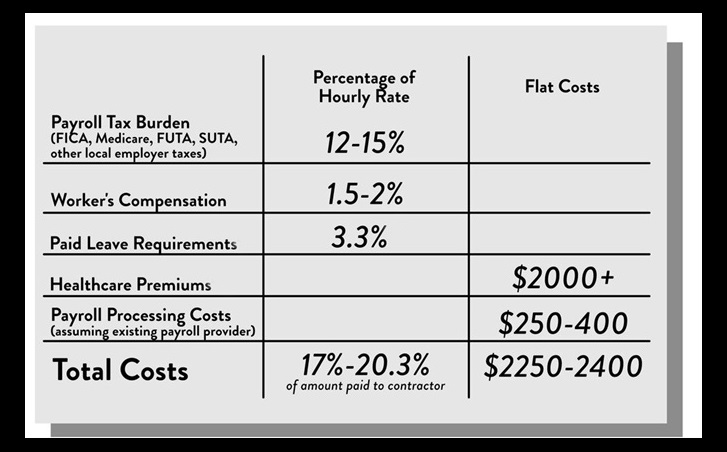
There are other costs to consider when calculating the hourly rate that you can afford to pay contract attorneys and paralegals when the parameters of their work necessitate classification as an employee.
For 1099 Contractors:
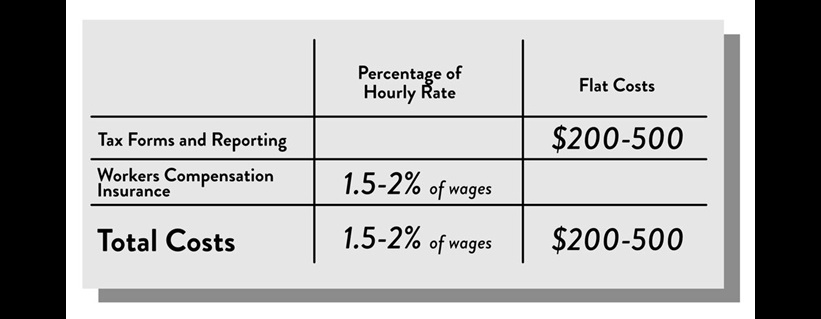
There are other tax and compliance costs to consider when determining the hourly rate that you can afford to pay contract attorneys or paralegals classified as independent contractors.

Some legal marketplaces disclaim being an agency and any responsibility for their candidates. They are not always in compliance with professional rules of conduct or they “comply” on technicalities such as the contract attorneys can only work in a paraprofessional capacity.
These marketplaces can be the worst of both worlds. While you may have access to more candidates, the rest of the process is largely DIY, with generally minimal vetting, limited to no guarantees. The costs, risks, and work of compliance still fall in your hands. While you will shoulder the majority of the risks and work that you would for DIY hiring, you do not own the contractor relationship and must pay a markup on hours worked just as you would through a staffing agency, and sometimes these markups are similar to an agency’s markup on independent contractors. You can read more about potential compliance issues with legal marketplaces here.
1. Pedigree
One of the top factors impacting the hourly rate for freelance lawyers was pedigree. We defined attorneys as having pedigree if they 1) attended a top 15 law school and/or 2) had worked at an AmLaw 200 firm as an associate. Having this background commanded the most significant change in hourly rates for freelance lawyers if experience was equal and the attorney did not have a dual professional license or STEM background (see below).

2. Commitment
Many legal contract jobs are inherently for a limited time. Still, a very short-term project with limited hours can increase the bill rate due to the non-billable time inevitable to taking on a new engagement. For the same reason, long-term contract jobs where contract attorneys or paralegals can save time on business development and new client engagement, the hourly rate tends to drop. A role with limited hours—defined as less than 15 hours per week—commands an average premium of 20% over long-term, full-time role. Here are the differences to the overall average freelance attorney bill rate we’ve seen in our data:
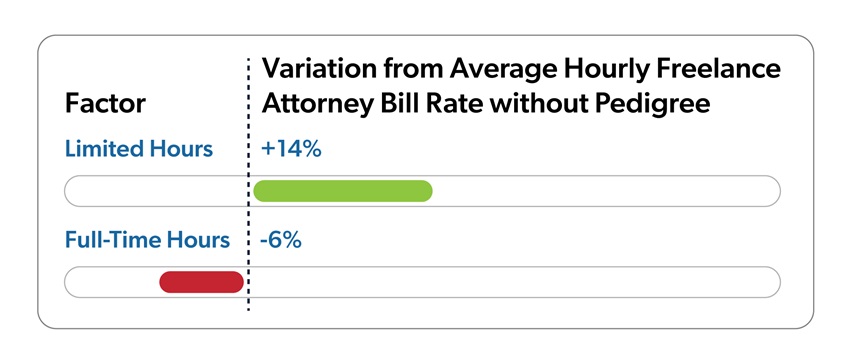
Impact on contract attorney and paralegal hourly rates based on the consistency of a project from Hire an Esquire platform data from January 2019-January 2021.
3. Experience
Not surprisingly, experience greatly impacts compensation for a role. Contract attorneys are generally expected to work autonomously and independently, so the majority of non-document review jobs require experience. Still, there are times when a client and/or a law firm owner does not want to pay senior- or partner-level rates for junior associate-level work and less experience is required for a role. Within our data, we see close to a 50% premium on hourly rates for a role that requires a seasoned contract attorney versus a junior contract attorney.

4. Billable or Non-Billable Work
According to Clio’s 2021 Legal Trends Report, the average attorney only bills 2.5 hours of their typical 8 hour workday. Contract attorneys and paralegals should have less non-billable time than permanent employees since they don’t have the same political, administrative, and business development duties. Still, contractors classified as W-2 employees must be paid for all hours worked regardless of whether they’re billable. When calculating the rate and how it works for your own cost structure, keep this in mind. If the job and work is properly classified as that of an independent contractor, you can come to an agreement with the contractor to pay only for billable work, and in this case, the hourly rate may be higher. See Chapter 4 for more insight on managing contractors and billable versus non-billable time.
5. Demand, Practice Area, and Type of Case
Rates—particularly in niche specialties—can vary slightly to dramatically based on emerging trends, legal issues, and major litigations underway. Also, lawyer’s fees vary depending on the client and what the market can bear. Corporations will engage different types of firms and pay different rates for “bet the company litigation” versus garden variety nuisance cases. And the same type of case can vary based on market timing—we’ve seen Japanese language doc review rates oscillate by 50% as multiple major litigations kept the limited number of reviewers ramped up and then settled. Data privacy attorney rates ramped dramatically upon General Data Protection Regulation (GDPR) and California Consumer Privacy Act (CPPA) deadlines and softened as more businesses met compliance deadlines and more attorneys became familiar with the laws. Rates for estate planning attorneys ramped up with the pandemic and then fell as vaccines, natural immunity, and the hospitalization and death rate dropped. We’ve used rate data for multiple years and normalized it for inflation to average out the effects of short-term surges. As you can see from the below, for most practice areas, there tends to be less than a 10% variation from the average rate with the exception of Tax Law, which often requires a CPA certification, and Life Science roles, where STEM backgrounds are often required.

The above rates represent the hourly rate paid to the contract attorney or paralegal and do not include payroll and/or agency fees. Also, note that if you connect with an attorney or paralegal running their own freelance practice and doing their own business development, while you won’t pay an agency service fee, you may pay a premium beyond these rates to reflect the time and financial investments made in business development and procuring work.
What's Changed Since Our Last Rate Analysis?
The most notable shift since our last analysis done in 2019–2020 (largely pre-pandemic or pandemic impact) was that remote work became common. Rates were normalized across geographies to the point that we don’t see a meaningful difference between the same type of legal work based on where it is performed. With lawyers who once lived in California and New York City working remotely from Florida, Texas, West Virginia, or other rural areas, rates do not vary by geography and cost of living as much as they did pre-pandemic. This doesn’t mean that experience working at a white shoe New York law firm with the related big bank or corporate experience or specific Big Tech experience in the Bay Area pre-pandemic doesn’t come with a premium. Likewise, if a role doesn’t require a specific bar license, and attorney backgrounds and skill sets are equal, the rate is largely the same regardless of whether the attorney works in Manhattan or Miami. This has resulted in increased rates for the average lawyer in the heartland and a slight decrease for big city attorneys who don’t have the unique, more highly valued experience that is often coupled with major metros.
If there were contract attorney and paralegal commandments, these would be the top five:
1. Start Small and Build Trust
We get it. For some of our clients, their first introduction to contract attorneys is an emergency and a leap of faith. They sign up at noon and have a contract attorney at work within hours for a project due the next morning (and in these cases, recommendations 2-5 are even more crucial!). This is why we have invested so much in our contract attorney and paralegal vetting and soft-skill analysis—to increase the chances of success even on short notice and even for small projects like that emergency brief! And in most cases, our clients have good outcomes in these emergencies.
Still, where you’re looking to make contract attorneys or paralegals a part of your operations strategy, we recommend, when possible, starting with a small, low stakes project to get a feel for a contract attorney or paralegal's work. And if you have multiple small similar projects you wish to outsource (e.g. contract review, motions) we recommend trying a few different contractors to see whom you gel with the best, whose work product you most prefer, and/or to identify multiple candidates that can act as a “bench” of talent with a known track record so that a contractor is always available when your go-to contractor may not be. At Hire an Esquire, we work with quite a few contractors for our marketing, content, design, and paid search and are generally looking to build long-term relationships. With this, we’ll often invest in paying multiple contractors to do the same project to see whose work we like the best or to build up our own talent bench.
Over time, as you develop trust, and you and your contractor become more familiar with each other, you can gradually or quickly (depending on your comfort level) increase the stakes of the work you outsource.
2. For Larger Projects Set Milestones (and Check-ins)
If you are handing off a large and/or complex project to a contract attorney or paralegal and expect that they complete it independently, we highly recommend breaking up the deliverables into increments and related deadlines, where certain portions of a project are "due" or can be reviewed by you to make sure your contract attorney or paralegal is on the right track and there were no misunderstandings in instructions. Think about your billing structure and agreements with clients and factor this time into the cost of outsourcing, as appropriate, if your contractor is billing you for non-billable time.
Setting milestones and reviewing work product in stages is particularly important the first time you are working with a new contractor and there is no familiarity with each other's work styles and expectations. You can structure this however it works best for your project, but this ensures that the contract attorney or paralegal doesn’t get too close to the deadline with nothing done, poor work quality, or having operated under an incorrect understanding of the project expectations.
3. Set Expectations, In Writing
For every project, it is worth investing the time to lay out expectations and to confirm them in writing, whether through a signed written agreement or via a follow-up email where the contract attorney or paralegal responds, confirming their understanding of these expectations. We also highly recommend reviewing these agreements in real time and having a kickoff call for the project. A few key things to lay out in writing to ensure you are on the same page are:
- Deadlines: Firmly agree upon a deadline or deadlines as discussed above if the project is larger and more complex. For your first project with a contractor, if possible, we recommend leaving enough time to review the work product thoroughly, provide feedback, and give the contractor a chance to implement this feedback before your own deadline.
- Time and Cost Estimates: It’s worthwhile to have an agreed-upon estimate with your contract attorney or paralegal of how much time a matter is expected to take. For projects where the contract attorney is classified as an independent contractor, clarify whether they’ll be billing all of their time or just billable time. If your contractor is classified as a W-2 employee or is billing non-billable time, confirm with them the expected breakdown of billable versus non-billable time. For all arrangements, be clear with your contractor what is billable time under your client agreement so that they can properly estimate this. Request that the contractor notify you promptly if they uncover anything that changes these estimates or their progress indicates they won’t meet their own projected budget.
- Agreed Upon Deliverables: While this will be unique for every project, confirm the expected end product as best you can and share examples of previous similar work you felt was up to par, if possible.
4. Provide Feedback
Few people are clairvoyant, and styles and preferences vary widely among lawyers. Therefore, providing feedback is crucial to ensuring that you get work that meets and exceeds your expectations and that you build a strong working relationship with a contract attorney or paralegal, which benefits all involved. Hint: In our soft-skills analysis, a contract attorney’s “poise” score provides insight into how they adapt and take feedback (note that 50% is average and anything above 50% is above average as weighted against our pool of 13,000 legal professionals).
5. Develop Long-Term Relationships
The maximum ROI from working with contract attorneys comes when you establish strong working relationships. Not only do you get a return on your own time investment in hiring, onboarding, and becoming familiar with one another’s work style and work product, but you also have the peace of mind of having a trusted professional that you can rely upon as necessary. This allows you to easily and reliably manage peak load leveling or the need for specialized expertise and ensure both efficiency and profitability as well as great results for your clients. Treating your contract attorney or paralegal as you would another colleague or team member by providing constructive feedback, increasing their rates as possible, and giving them more hours or responsibility as warranted all go towards building rapport and ensuring a pleasant and productive working relationship.
Closing Notes on Contract Attorney and Paralegal Management
The skills that help you manage contract attorneys well are the same skills that make you good at managing your clients and permanent employees. Managing people is it’s own skill set. Most of us who have worked in the legal profession are painfully aware it was not taught or emphasized in law school and, therefore, is not within the average attorney skill set. Still, you can improve and develop here with practice and the will to do so.
When you work with Hire an Esquire and good legal staffing agencies, as discussed above, we bring years of expertise to the contract attorney and paralegal hiring and management process. We are here to help mediate sticky situations and disputes generally—and are much more able to be helpful when the above practices are followed. And we’re continually providing our clients with information and resources to become better people managers. For starters, you can check out our Project Outline.







